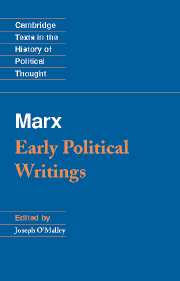Book contents
- Frontmatter
- Contents
- Acknowledgements
- Editor's Introduction
- Chronology of Marx's Life and Career, 1818–1848
- Bibliography
- Editor's and Translator's Note
- From the Critique of Hegel's Philosophy of Right (§§261–313)
- ‘On the Jewish Question’
- ‘A Contribution to the Critique of Hegel's Philosophy of Right: Introduction’
- From the Paris Notebooks
- ‘Critical Marginal Notes on “The King of Prussia and Social Reform. By a Prussian”’
- Points on the State and Bourgeois Society
- ‘On Feuerbach’
- From ‘The German Ideology’: Chapter One, ‘Feuerbach’.
- From Poverty of Philosophy
- Address on Poland
- Index
- Cambridge Texts in the History of Political Thought
‘On the Jewish Question’
Published online by Cambridge University Press: 05 June 2012
- Frontmatter
- Contents
- Acknowledgements
- Editor's Introduction
- Chronology of Marx's Life and Career, 1818–1848
- Bibliography
- Editor's and Translator's Note
- From the Critique of Hegel's Philosophy of Right (§§261–313)
- ‘On the Jewish Question’
- ‘A Contribution to the Critique of Hegel's Philosophy of Right: Introduction’
- From the Paris Notebooks
- ‘Critical Marginal Notes on “The King of Prussia and Social Reform. By a Prussian”’
- Points on the State and Bourgeois Society
- ‘On Feuerbach’
- From ‘The German Ideology’: Chapter One, ‘Feuerbach’.
- From Poverty of Philosophy
- Address on Poland
- Index
- Cambridge Texts in the History of Political Thought
Summary
Bruno Bauer, The Jewish Question Braunschweig, 1843
The German Jews desire emancipation. Which emancipation do they want? Civic, that is, political emancipation.
Bruno Bauer replies to them: nobody in Germany is politically emancipated. We ourselves are not free. How are we supposed to liberate you? You Jews are egoists if you demand a special emancipation for yourselves as Jews. You have to participate as Germans in the political emancipation of Germany, as human beings in the emancipation of humanity, and not perceive the special form of your oppression and your humiliation as an exception to the rule, but rather as confirmation of the rule.
Or do the Jews demand equality with the Christian subjects? In that case they recognise the Christian state to be justified, they acknowledge the regime of general subjugation. Why should your special yoke displease you when you are satisfied with the general yoke? Why should the Germans take an interest in the liberation of the Jews when the Jews take no interest in the liberation of the Germans?
The Christian state knows only privileges. In this state the Jews have the privilege of being Jews. As Jews they have rights which the Christians do not have. Why do they desire rights which they do not have and which the Christians enjoy?
If the Jew wishes to be emancipated from the Christian state, he demands that the Christian state renounce its religious prejudice.
- Type
- Chapter
- Information
- Marx: Early Political Writings , pp. 28 - 56Publisher: Cambridge University PressPrint publication year: 1994
- 24
- Cited by

